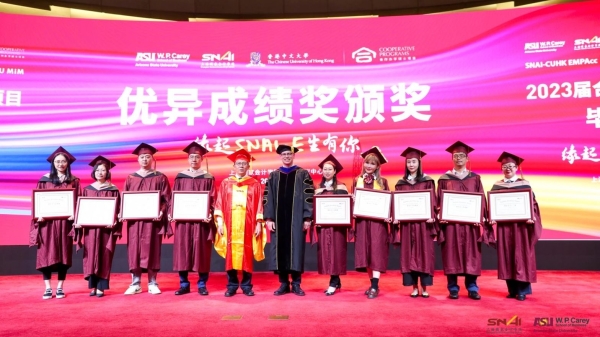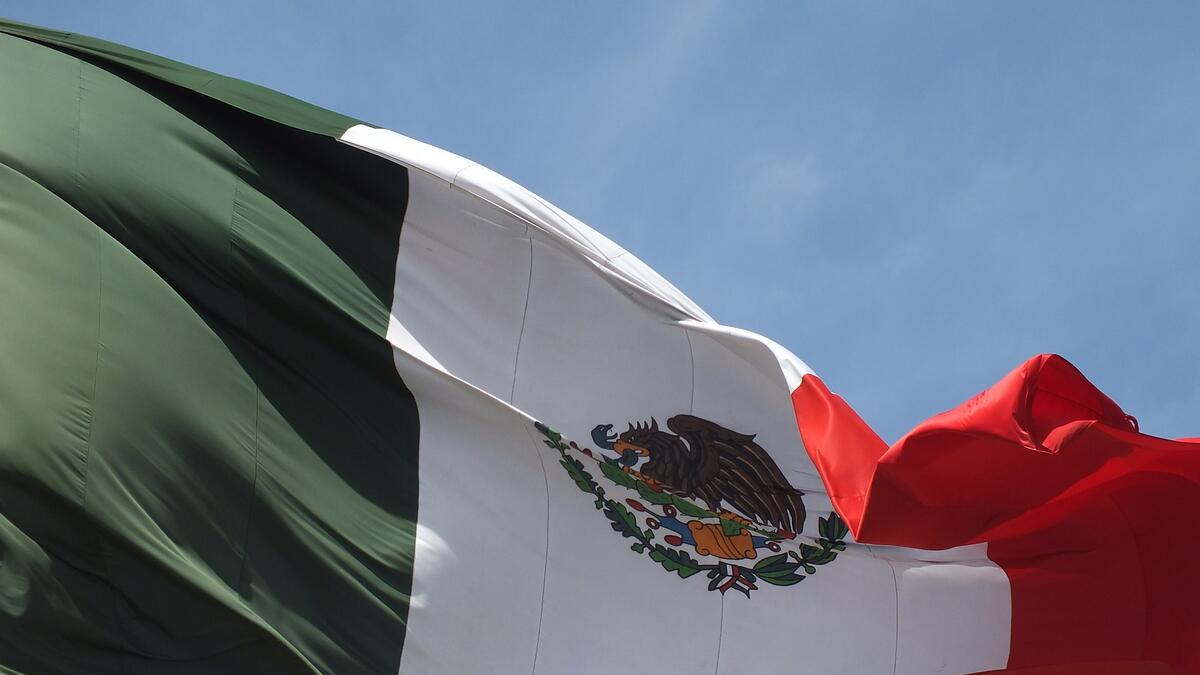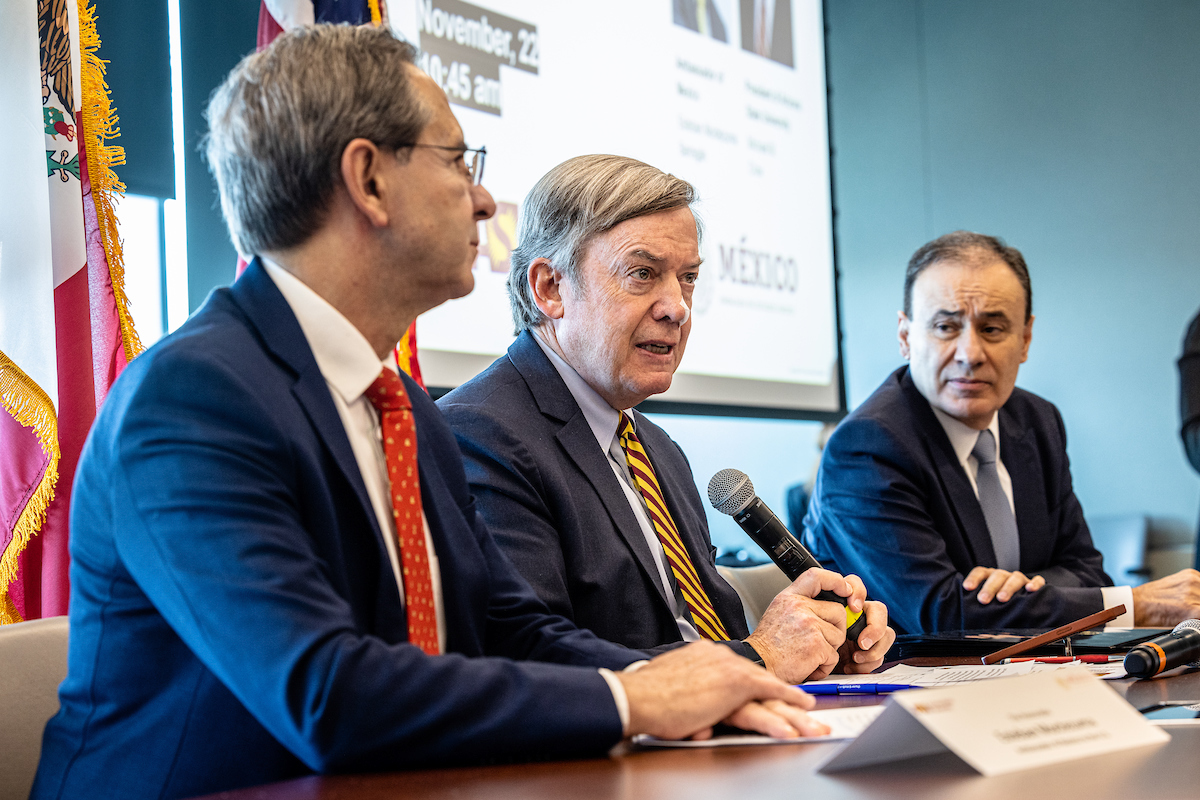When President Barack Obama visited Mexico in May 2013, he praised America’s southern neighbor for its commitment to democracy and a growing economy, and urged both nations to “work together in mutual interest and respect.”
Arizona State University’s Mexico outreach was well underway by 2013 after it established a central unit the previous year within the Office of University Affairs to plan and manage engagements that have now amassed a vast portfolio of partnerships and research initiatives.
One of the top priorities for ASU in Mexico this year is work connected to the CHIPS and Science Act enacted by Congress and signed into law by President Joe Biden on Aug. 9, 2022.
Mexico’s Ambassador to the U.S. Esteban Moctezuma Barragán and Sonora Gov. Alfonso Durazo met with ASU President Michael Crow in November to sign a memorandum of understanding, formalizing CHIPS Act-related collaboration. The $52.7 billion initial act investment includes $500 million for international partnerships.
(From left) Mexico’s Ambassador to the U.S. Esteban Moctezuma Barragán, ASU President Michael Crow and Sonora Gov. Alfonso Durazo during the November MOU signing. Photo by Charlie Leight/ASU News
“The visit by Ambassador Moctezuma and Gov. Durazo to sign the MOU was significant,” said Paola Hidalgo, executive director for Mexico relations with ASU’s Office of Government and Community Engagement. “It elevates ASU as a partner and gives the university a voice in the bilateral talks connected to the historic opportunity created by the act.”
The CHIPS Act aims to increase semiconductor (i.e., microchips) manufacturing in the United States. American companies produce only 10% of the world's supply of microchips, while East Asia contributes 75%, according to the White House. Because microchips are critical to everything from mobile phones to computers to vehicles and appliances, their production is essential to many sectors, including national defense.
The MOU opens the door for ASU to initiate new projects with Mexico’s higher education sector, along with industry leaders, to work on the various aspects of the act — research, development, manufacturing and workforce development.
Following the November MOU signing, Crow traveled to Mexico City in December, where he met with Tecnológico de Monterrey and Universidad Autónoma de Guadalajara administrators. The long-standing ASU partners provided Crow updates and discussed areas of future collaboration. The president also led a talk about his latest book “The Fifth Wave: The Evolution of American Higher Education” before participating in a related panel with Mexican academics.
Executive-level and academic engagements will be instrumental to advancing CHIPS Act initiatives, a top priority for ASU-Mexico collaboration in 2023, Hidalgo said. Two key deliverables this year are semiconductor manufacturing and workforce development. This may include microchip production process research and analysis, along with research to develop new, innovative technologies.
ASU will also work with Mexico on the workforce education, or “upskilling,” needed to provide work-ready employees to this expanding sector.
Arizona hosts several semiconductor manufacturers, including two of the largest, Intel and TSMC, making the state a global semiconductor hub.
"With the help of Mexican partners, the Arizona-Sonora region can become the North American hub for global semiconductor production,” Hidalgo said. “It is an important opportunity for ASU and the state.”
Although CHIPS Act activities are high priority in the ASU-Mexico space, the university plans to continue working on other important Mexico projects this year, including the Quantum Collaborative with Tec de Monterrey, Hidalgo said. The collaborative brings together science academics and research institutions to advance quantum information, tech research, education and workforce development.
ASU will also collaborate with Mexico’s embassy and Sonoran partners supporting the “Sonora Plan” — a strategy set in motion by Mexican President Manuel Lopez Obrador to build infrastructure to produce clean energy and mine for lithium to support electric vehicle production.
Other Sonora work will continue as ASU helps foster knowledge and innovative solutions to address water access in the Mexican state, Hidalgo said.
Related to the arts, Universidad de Guadalajara (UdeG) is advancing work in ASU’s California Center by bringing Mexican students to participate in an intensive UdeG film production course, while also opening educational and cultural opportunities to local residents with ties to the state of Jalisco.
Expanding relations with Mexican academic and government partners remains a top priority for ASU. During Moctezuma Barragán’s first ASU visit in October 2021, Crow expressed support for increased cross-border collaboration.
“We are very interested in literally everything we can do,” Crow said. “We want to work with you on projects that set the example of what can be done. That’s basically how we work, and then stuff starts happening.”
More Business and entrepreneurship

New ASU certificate to address veteran underemployment
Veterans and military spouses bring a wealth of talent to the corporate world. Unfortunately, human resources and hiring managers without military backgrounds often struggle to understand…

ASU China Executive MBA ranked No. 7 in world by Financial Times
In the 2024 Financial Times rankings for Executive MBA (EMBA) programs, Arizona State University's W. P. Carey School of Business China Executive MBA program ranked No. 7 in the world, ahead of the…

ASU, Ghana partnership enhances supply chain practices in Africa
As a New American University, ASU defines the communities it serves as including both its backyard neighbors and colleagues around the world. For the past four years, Arizona State University…

